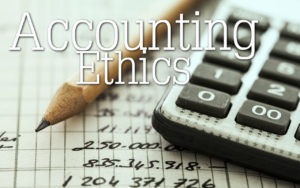Marc Wieselthier, a certified public accountant and partner at a New York accounting firm (the “Firm”), pled guilty to participating in a scheme to obtain millions of dollars in loans by making false statements and providing false and fraudulent  documents to two commercial banks based in New York (the “Banks”) concerning the financial condition of a Florida-based cosmetics company (the “Company”) that was one of his clients. Here’s an example of accounting ethics at its worst!
documents to two commercial banks based in New York (the “Banks”) concerning the financial condition of a Florida-based cosmetics company (the “Company”) that was one of his clients. Here’s an example of accounting ethics at its worst!
Manhattan U.S. Attorney Preet Bharara said: “Marc Wieselthier has admitted to lying about the financial condition of a company to induce banks to lend the company millions of dollars. Relying on false information, the banks made loans that ended up defaulting with nearly $5 million still owed. Wieselthier now joins his co-conspirators in awaiting sentencing for his crime.”
THE BACKGROUND
Wieselthier was a licensed certified public accountant at the Firm. Since 2009, Wieselthier has been a partner at the Firm. The Company and its chief executive officer (“CEO”) were clients of Wieselthier, who performed, among other things, year-end audits of financial statements for the Company.
From 2007 through 2014, the Company, through its officers, fraudulently induced the Banks into lending the Company millions of dollars by repeatedly making, and causing to be made, materially false and misleading statements about the Company’s financial condition. Accounting ethics? I don’t think so. Specifically, the Company falsely inflated its sales and accounts receivable on “borrowing base certificates” and in financial statements audited by Wieselthier, which were provided to the Banks pursuant to loan agreements between the Banks and the Company. The Company used those falsely inflated sales and accounts receivable to mislead the Banks about the Company’s true financial performance so that the Company could secure and draw down millions of dollars in revolving loans from the Banks that the Company would not otherwise have been entitled to receive. There is little worse than this fraud and clearly an example of what Accounting Ethics is not.
As a part of the scheme, on an annual basis, Wieselthier knowingly issued unqualified audit reports known as “clean opinions” falsely certifying that the Company’s financial statements fairly, and in all material respects, reflected the true financial condition of the Company and were in conformity with generally accepted accounting principles (“GAAP”). In truth and in fact, at the time that Wieselthier issued those “clean opinions,” Wieselthier knew that the Company’s financial statements falsely overstated the Company’s accounts receivable and understood that the Banks would rely upon those false financial statements in loaning money to the Company. Wieselthier hid his accounting work for the Company from his own partners and associates in an apparent effort to conceal the fraud. Again, accounting ethics? No!
In March 2014, the Company defaulted on the loans at issue. At that time, the Company’s outstanding balance on the loans was more than $4.8 million.
THE OUTCOME
Wieselthier, 57, of Plainview, New York, pled guilty to one count of conspiracy to commit bank fraud, which carries a maximum sentence of 30 years in prison. Wieselthierwas sentenced today to 27 months in prison.
YOUR COMMENTS ARE WELCOME!


